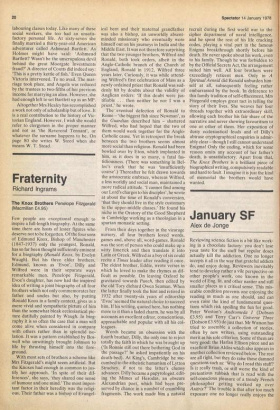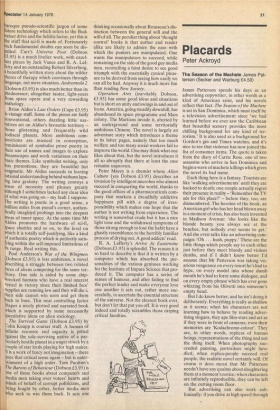January SF
Alex de Jonge
Reviewing science fiction is a bit like working in a chocolate factory: you don't lose your taste for the stuff but regular doses actually kill the addiction. One no longer accepts it all in the way that grateful addicts do, and enjoy doing. Reviewers inevitably tend to develop rather a vile perspective on other people's work, one known in the world of Eng. lit, and other nastier and still smaller places as a critical sense. This miserable condition prevents one enjoying the reading as much as one should, and can even raise the kind of fundamental questions which risk spoiling the fun for good. Peter Weston's Andromeda 1 (Dobson £3.95) and Terry Carr's Universe Three (Dobson £3.95) do just that. Mr Watson has tried to assemble a collection of stories, often by new writers, using outstanding merit as his sole criterion. Some of them are very good: the Harlan Ellison piece and an excellent Brian Aldiss which also appears in another collection reviewed below. The rest are all right, but they do raise those damned questions such as: 'Why do I read this stuff? Is it really trash, or still worse the kind of pretentious rubbish that is read with the self-conscious pleasure of a trendy. French philosopher getting worked up over Asterix?' The trouble is that after too much exposure one no longer really enjoys the aroque pseudo-scientific jargon of some uture technology which refers to the Budeiser drive and the Schlitz factor, yet this is he stuff that sci-fi is made of. Fortunately uch fundamental doubts can soon be diselled. Carr's Universe Four (Dobson 3.95) is a much livelier work, with excelent pieces by Jack Vance and R. A. Laferty and an outstanding Robert Silverberg, beautifully written story about the wilder hores of therapy which convinces through anguage, not mere situation. Andromeda 2
Dobson £3.95) is also much better than its redecessor; altogether tauter, light-years om space opera and a very rewarding nthology.
Brian Aldiss's Last Orders (Cape £3.95) vintage stuff. Some of the pieces are fairly onventional, others dazzling little . naratives set on Aldiss's favourite territory — hose glistening and frequently wild odiacal planets. More ambitious comositions are musical in conception,
eminiscent of symbolist prose poetry in heir use of names and images to explore reamscapes and work variations on their asic themes. Like symbolist writing, only ess pretentious, they are beautiful but nigmatic. Mr Aldiss succeeds in leaving ational understanding behind without lapsng into gratuity. The writing conveys a ense of necessity and pleases greatly lthough I sometimes lacked any clear idea f what was going on — my fault I suppose. he writing is poetic in a good sense, a illion miles from pseud's corner, authenically imagined probings into the deepest eas of inner space. At the same time Mr ldiss promotes the hardware of sci-fi, pace shuttles and so on, to the level on hich it is totally self-justifying, like a kind f authentic poetry which is perfectly satising within the self-imposed limitations of ts range. Real writing this.
Poul Anderson's War of the Wingmen Dobson £3.95) is less ambitious, a novel escribing a struggle between two, related aces of aliens competing for the same teritory. One side is aided by some shipreeked humans who have a real interest vested in victory since their limited fooe supplies are running low and they will die L. heir side cannot win soon and get them ack to base. This neat controlling factor hapes a nicely plotted and narrated book hich is supported by some necessarily Peculative ideas on alien sociology.
The Survival Gamc (Dobson £3.95) by olin Knapp is coarser stuff. A human of finite resource and sagacity is pitted gainst the sole-surviving native of a paricularly hostile planet in a wager struck by a uple of star lords playing for high stakes.
t is a work of fancy not imagination — there oes that critical sense again — but is enter ainment of a high order. Tom Purdom's he Barons of Behaviour (Dobson £3.95) is ne of those books about computers and edia men taking over voters' hearts and Inds of behalf of corrupt politicians, and eing fought by other, better media men • ho seek to win them back. It sets one thinking occasionally about Rousseau's distinction between the general will and the will of all. The peculiar thing about 'thought control' books is that author and reader alike are likely to admire the ease with which the punters are manipulated. One wants the manipulators to succeed, while remaining on the side of the good guy media men, reconciling a faint desire to see good triumph with the essentially cynical pleasure to be derived from seeing how easily we can all be had. Anyway it is much more fun than reading New Society.
Operation Ares (inevitably Dobson, £3.95) has some good ideas and situations but is short on unity and swings in and out of focus. America, going steadily downhill, has abandoned its space programme and Mars colony. The Martians invade it, abetted by an underground and some territorially ambitious Chinese. The novel is largely an adventure story which introduces a theme in its latter pages, namely that too much welfare and too many social workers fail to improve the world. One may think what one likes about that, but the novel introduces it all so abruptly that there at least the case remains unproven.
Peter Macey is a chemist whose Alien Culture (yes Dobson £3.95) describes an invasion by intelligent microbes who almost succeed in conquering the world, thanks to the good offices of a pharmaceuticals company that markets a dreadfully addictive happiness pill with a degree of irresponsibility which makes one hope that the author is not writing from experience. The writing is somewhat crude but it has a nice light tone and the withdrawal symptoms of those strong enough to lose the habit have a ghastly resemblance to the horribly familiar process of drying out. A good addicts' read.
R. A. Lafferty's Arrive At Easterwine (Dobson £3.95) is splendid. The reason it is so hard to describe is that it is written by a computer which has absorbed the per sonalities of the various geniuses working for the Institute of Impure Science that pro duced it. The computer has a series of senses of humour, and after failing to find the perfect leader and make everyone love one another it sets out, rather more suc cessfully, to ascertain the essential structure of the universe. Not the clearest book ever, but don't let that put you off. It is very good indeed and totally scrambles those carping critical faculties.































 Previous page
Previous page